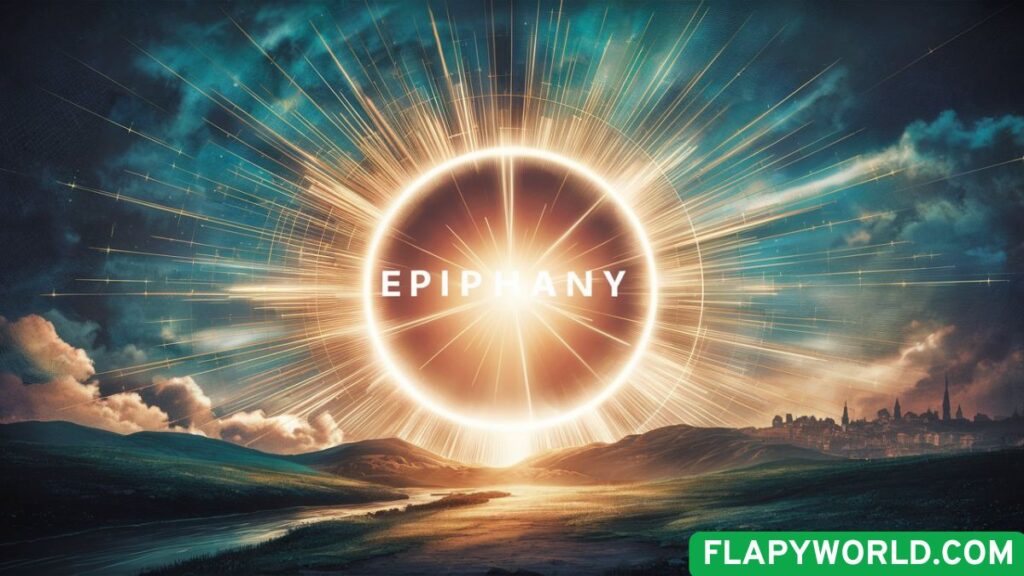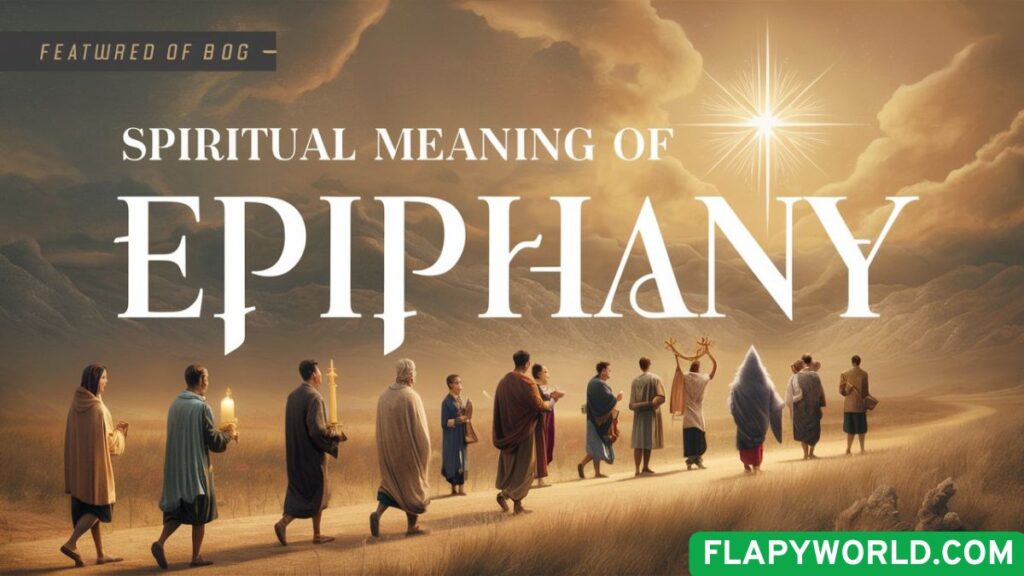Epiphany is a Christian holiday that celebrates the spiritual meaning of Epiphany. It marks when Jesus revealed Himself to the world. The word Epiphany means “appearance” or “manifestation.” This day honors Jesus’ birth, His baptism, and the visit of the Wise Men, showing God’s love is for everyone.
Have you ever wondered why January 6th is special? Epiphany teaches lessons about faith, guidance, and God’s light. From the story of the Magi to Jesus’ first miracles, this day is full of inspiration. It encourages believers to reflect, follow God’s path, and recognize His presence in daily life.
The spiritual meaning of Epiphany connects history with modern life. People celebrate with church services, prayers, and traditions like the Wise Men’s journey. It reminds believers that God reveals Himself in many ways and that faith, hope, and love are for everyone.
What is the Meaning of “Epiphany”?
The word Epiphany literally means “appearance” or “manifestation,” capturing the essence of the holiday as a celebration of God showing himself to humanity. The Epiphany Bible meaning highlights four key moments where Jesus revealed his divinity: his birth, the Magi and Epiphany, his baptism, and the miracle at Cana water into wine. In Western Christianity, the visit of the Magi represents the appearance of Jesus to the Gentiles, showing that God does not favor one group over another but welcomes all who seek him. In Eastern Christianity, Epiphany celebrates Jesus’ baptism, when God declared, “This is my Son, whom I love” (Matthew 3:17). This event is remembered as a moment of spiritual revelation in Epiphany, revealing Christ’s identity to the world.
The Epiphany holiday Christian meaning extends beyond these events. It reminds believers that God continually reveals himself in small and large ways, in daily blessings, guidance, and in the light of spiritual understanding. Bible verses about Epiphany, such as Isaiah 60:1-5, reinforce this by emphasizing light, guidance, and divine glory: nations are drawn to God’s light, just as the star of Bethlehem and wise men were drawn to Jesus. Understanding what does Epiphany celebrate helps believers see the holiday as more than historical—it’s a reminder to welcome Christ into every area of life.
Origin and History of Epiphany
The history of Epiphany holiday traces back to the early Christian church. Initially, the Church organized the Christian liturgical year to focus on Jesus’ life and work. The seasons included Advent, Lent, Pentecost, Easter, and Christmas. By the third century, church leaders established Epiphany to honor the manifestation of Christ. It celebrated Jesus’ birth, the adoration of the Magi, Epiphany and Jesus’ baptism, and his first miracle at Cana. Over time, Christmas became the primary day to celebrate Jesus’ birth, and Epiphany focused on revelation and divine manifestation.
In medieval Europe, Epiphany celebrations varied widely. Italy saw grand Twelfth Night traditions, including processions, nativity plays, and feasts. Spanish-speaking countries created the Three Kings Day meaning by having children receive gifts from the Magi instead of Santa Claus. In the Eastern Orthodox Church, it became the Feast of Lights, celebrating baptism as a moment of spiritual illumination. In the USA, immigrant communities brought these customs, combining them with local practices. The origin of Epiphany in Christianity reminds us that this holiday is both historical and living, linking early traditions with contemporary spiritual reflection.
Traditions of Epiphany Celebration
Epiphany celebrations focus on Jesus’ manifestation of Christ in various forms. At his birth, angels announced him to the shepherds; the Magi and Epiphany revealed him to the Gentiles; his baptism showed his divine sonship; and the miracle at Cana water into wine displayed his authority over nature. These events are remembered through a mix of religious and cultural traditions.
In many countries, children celebrate Three Kings Day meaning by leaving shoes with straw, which are later filled with gifts. The King’s Cake tradition invites a trinket baked inside a cake, making the finder “King or Queen” for the day, reminding believers of their calling as a royal priesthood 1 Peter 2 reference. In the USA, churches may hold special services using Epiphany readings in Common Book of Prayer, while families use nativity displays, stars, and music to reflect on the spiritual revelation in Epiphany.
| Tradition | Description | Cultural Significance |
| Twelfth Night traditions | Children leave shoes or participate in feasts | Europe and Latin America |
| King’s Cake tradition | A cake with a trinket inside | Symbolizes the royal priesthood |
| Feast of Lights | Eastern Orthodox baptism celebrations | Highlights spiritual illumination |
| Nativity and star decorations | Church and home displays | Reminds of the star of Bethlehem and wise men |
Even removing Christmas decorations becomes a meaningful ritual, symbolizing closure of the season and a focus on God’s revelation. These practices show that Epiphany meaning and traditions connect historical events, faith, and daily life.
Read Also: Why Does My Cat Follow Me Everywhere Spiritual Meaning
Do All Christians Celebrate Epiphany/Three Kings Day?

Not all Christians observe Epiphany, though it is widely recognized among Roman Catholics, Lutherans, Anglicans, and Eastern Orthodox Christians. In the USA, observance often depends on the denomination or personal family traditions. The Roman Catholic Epiphany celebration may involve church processions, blessings, and readings, while the Eastern Orthodox Feast of Lights emphasizes baptism and spiritual illumination.
Celebrating Epiphany, regardless of denomination, reminds believers why Christians celebrate Epiphany: to acknowledge the appearance of Jesus to the Gentiles, his divine nature, and his continued guidance in their lives. Even those who do not formally celebrate can reflect on the holiday’s meaning by remembering the Magi, Christ’s baptism, and the miracles that reveal God’s power and presence. Understanding Epiphany church traditions gives context to the deeper spiritual lessons within the holiday.
Reminders that Epiphany Brings
Epiphany offers many physical and spiritual reminders of Jesus’ life. The star of Bethlehem and wise men symbolize guidance and the pursuit of truth. Lights, nativity scenes, and music encourage believers to reflect on Christ’s presence and shine bright in their own lives. The shape of Christmas trees reminds us of the Trinity, while ornaments and decorations echo the gifts brought by the Magi.
These reminders also include lessons from daily life: showing kindness, generosity, and spiritual awareness. Just as the Magi and Epiphany story points to discernment and dedication, believers are encouraged to follow God’s guidance even when the path is unclear. The spiritual revelation in Epiphany teaches that God reveals himself in many ways, from scripture to personal experiences, emphasizing both reflection and action.
A Prayer for Epiphany
Lord Jesus,
Thank You for revealing Yourself to us in so many ways. We rejoice in the appearance of Jesus to the Gentiles, in Your baptism, and in the miracle at Cana water into wine. Help us see Your presence in our daily lives and follow Your light, just as the star of Bethlehem and wise men guided their journey. Transform our hearts to reflect Your love and grace. May we live as part of Your royal priesthood 1 Peter 2 reference, sharing Your truth and joy. Amen.
A Time of Revelation
Epiphany is truly a time of revelation. It reminds us that God reveals himself not only through scripture but also through everyday experiences, acts of kindness, and the wonders of creation. The spiritual meaning of Epiphany encourages believers to open their hearts and minds to divine guidance, to rejoice with those who rejoice, and to share hope with those who mourn. By reflecting on the Magi and Epiphany, Jesus’ baptism, and the miracle at Cana water into wine, we celebrate God’s universal love. In doing so, we embrace the Epiphany holiday Christian meaning, allowing our lives to shine as witnesses to His presence.
Ancient to Modern
Epiphany has been celebrated for centuries, bridging ancient to modern Christian life. Originally, it marked the manifestation of Christ through His birth, the Magi and Epiphany, baptism, and first miracle. Early Christians established the origin of Epiphany in Christianity to reflect God’s universal love. Today, the holiday connects historical traditions to spiritual reflection, showing God reveals Himself in all cultures.
Modern observances still honor these ancient roots. From Roman Catholic Epiphany celebration in churches to cultural Epiphany traditions worldwide, believers recognize God’s presence daily. Even in the USA, people follow the Epiphany holiday Christian meaning, emphasizing faith, generosity, and joy. Epiphany continues to inspire, reminding us that God’s revelation transcends time and place.
From Old to New
The journey from old to new shows how Epiphany meaning and traditions evolved. Early Christians celebrated the Feast of Epiphany / Feast of Lights, combining spiritual and cultural elements. Over centuries, customs like Twelfth Night traditions and the King’s Cake tradition appeared. These rituals celebrated Christ’s manifestation while giving communities a shared moment of faith and joy.
Today, these traditions adapt to modern life. Churches use Epiphany readings in Common Book of Prayer, families display stars, and children receive gifts on Three Kings Day meaning. Removing decorations on Epiphany symbolizes moving forward spiritually. The old practices meet modern interpretation, creating a holiday that teaches faith, reflection, and the ongoing spiritual revelation in Epiphany.
What is Epiphany?
Epiphany means “appearance” or “manifestation,” highlighting God revealing Himself to humanity. Western Christianity focuses on the appearance of Jesus to the Gentiles in the Magi and Epiphany story, while Eastern traditions emphasize Epiphany and Jesus’ baptism. It also includes the miracle at Cana water into wine, showing Jesus’ divine power. Epiphany is a moment of joy and spiritual insight.
In the USA, Christian holidays after Christmas include Epiphany as a bridge from Christmas to the rest of the liturgical year. It teaches lessons of guidance, generosity, and faith. Observing Epiphany church traditions encourages reflection on God’s light, the star of Bethlehem and wise men, and His presence in everyday life.
Read Also: Birds Chirping at Night Spiritual Meaning: Messages from the Dark
Why does Epiphany matter?
Epiphany matters because it celebrates God’s universal love. The holiday reminds us that Bible verses about Epiphany show God welcomes everyone who seeks Him. The appearance of Jesus to the Gentiles symbolizes inclusion and hope. By reflecting on the Magi and Epiphany, believers learn about faith, obedience, and following God’s guidance in their own lives.
It also matters as a spiritual milestone. The Epiphany feast day significance encourages reflection, prayer, and commitment to God. Observing the holiday through Epiphany prayers and blessings or church services, like Eastern Orthodox Feast of Lights, strengthens faith. Even personal celebrations like nativity displays emphasize the spiritual revelation in Epiphany and daily application of divine lessons.
How is Epiphany relevant for you today?

Epiphany is relevant today because it connects timeless lessons to modern life. The spiritual revelation in Epiphany reminds believers that God continues to reveal Himself through guidance, miracles, and daily experiences. Following the star of Bethlehem and wise men encourages discernment, patience, and dedication. These teachings remain meaningful for personal growth and faith development.
Celebrating Epiphany in the USA blends tradition with daily life. The King’s Cake tradition or church Epiphany readings in Common Book of Prayer create moments of reflection. Recognizing God’s manifestation through the miracle at Cana water into wine or Jesus’ baptism helps believers experience spiritual insight. Epiphany encourages living faithfully, spreading light, and embracing divine revelation today.
This Epiphany Sunday
This Epiphany Sunday invites believers to reflect on Christ’s appearance to the world. The holiday highlights the Epiphany and Jesus’ baptism, the Magi and Epiphany, and the miracle at Cana water into wine. Through church services or family traditions, followers remember God’s universal love and guidance. It’s a day to seek spiritual insight and celebrate divine revelation.
Families and churches mark the day with blessings, prayers, and shared traditions. Observing Roman Catholic Epiphany celebration or Eastern Orthodox Feast of Lights strengthens community and faith. This day encourages reflection, renewal, and gratitude. Recognizing the Epiphany Bible meaning in life today reminds believers to shine bright and follow God’s guidance in every season.
FAQ’s
What is the main message of the Epiphany?
The main message of Epiphany is that God reveals Himself to all people, showing His universal love and guidance through Jesus Christ.
What is the spiritual significance of January 6th?
January 6th marks the day Christians celebrate Jesus’ manifestation to the world, including the visit of the Magi and His baptism.
What does Epiphany mean in simple terms?
Epiphany means “appearance” or “manifestation,” referring to Jesus revealing His divine nature to humanity.
What symbolizes an Epiphany?
The star of Bethlehem, the Magi, Jesus’ baptism, and the miracle at Cana symbolize Epiphany.
What are the three gifts of the Epiphany?
The three gifts are gold, symbolizing kingship; frankincense, representing divinity; and myrrh, foreshadowing sacrifice.
Conclusion
The spiritual meaning of Epiphany shows how Jesus revealed Himself to the world. It teaches that God loves everyone and wants people to follow His path. On this day, Christians remember the visit of the Wise Men, Jesus’ baptism, and His first miracle at Cana. Epiphany helps people understand that God’s light and guidance are for all. Celebrating it reminds everyone to live with faith, kindness, and hope every day.
Understanding what is the spiritual meaning of Epiphany also connects the past with today. People celebrate with prayers, church services, and special traditions. The holiday encourages believers to reflect on Jesus’ life and example. It helps people grow spiritually and live in a way that honors God. Epiphany is a time to rejoice in God’s love and share it with others.

James Morris is an experienced blogger and content creator at FlapyWorld.com. With a passion for writing and sharing insightful content, James specializes in crafting engaging posts on a variety of topics, including wishes, messages, and inspirational content. His goal is to inspire, inform, and connect with readers through thoughtful and well-researched articles.







